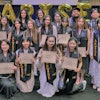During the early days of World War II, Aiko Herzig-Yoshinaga was a Los Angeles high school student counting the days until the prom when the U.S. government forced her family and tens of thousands of other Japanese-Americans from their homes and incarcerated them at remote camps. She was herded from one rudimentary camp to another in a series of moves throughout the war. Afterward, she moved to New York City and started over.
By the time President Ronald Reagan signed legislation in 1988 formally apologizing to each of the surviving Japanese-Americans, Herzig-Yoshinaga had played an integral role in the activist movement demanding redress. Without her contributions, the government might not have ever admitted the injustices and how racism fueled its wartime decision-making.
Today, the University of California, Los Angeles is celebrating the recent release of Herzig-Yoshinaga’s collection of personal papers. Now, educators and the general public can view documents and legal memoranda retrieved during Herzig-Yoshinaga’s years of research and gathering evidence proving that the mass incarceration was unnecessary.
Herzig-Yoshinaga’s unexpected, activist journey began after the war when, as a single mother, she became a clerical worker in order to support her three children. The job led her to become well-versed with bureaucracy, documentation and nomenclature. Rarely did she think about, much less speak of, the trauma endured at the camps. She had watched her father die at a camp, and she had given birth to her first child while incarcerated, feeling helpless whenever the baby got sick from squalid conditions and shortage of nutrition.
In the 1960s, however, she waded into political activism by joining a group of other Nisei — Japanese-Americans whose parents were immigrants — who were protesting the Vietnam War and calling for its end.
The following decade, she married Jack Herzig, and the couple moved to Washington, D.C. To her shock and dismay, Jack Herzig had never heard of the mass incarceration of Japanese-Americans, despite serving as an Army combat paratrooper during the war. This underscored for Herzig-Yoshinaga how the U.S. government’s sorry treatment of Japanese-Americans was largely unknown among the rest of the American public.
Because of their close proximity to the National Archives and Records Administration, Herzig-Yoshinaga began spending day after day digging up documents connected to her family’s forced removal and confinement at the camps.














